Here is a free GUI tool for WINGET that lets you bulk install programs, remove installed programs and Microsoft Store apps, and update programs at once on a Windows 11/10 computer. This open-source tool is named WingetUI and its name is self-explanatory. While the official Windows Packet Manager (winget or winget.exe) CLI tool is quite good and works by executing commands, this tool makes that work easier for those who prefer GUI over command-line utility.
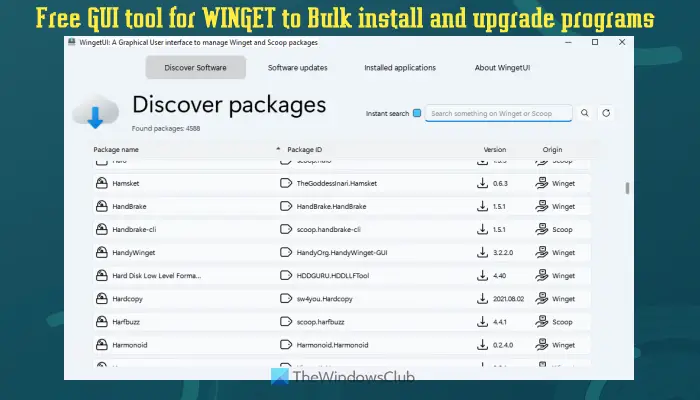
A user-friendly interface is provided by this tool to search the packages instantly. The tool helps to search and install programs from the winget repository and Scoop (the developer may add more package managers in the future). More than 4500+ software packages are available that you can install. The process to upgrade and remove the installed programs is also pretty easy.
How to use WingetUI to Bulk Install, Uninstall, Update Programs
Using this tool is pretty simple. You have to complete the standard installation process and launch the tool to open its interface. The tool interface has three main sections that cover everything. But before you try this tool or any other tool, we recommend creating a system restore point and having a backup of your important stuff.
Let’s check all the sections of this tool one by one.
Discover Software
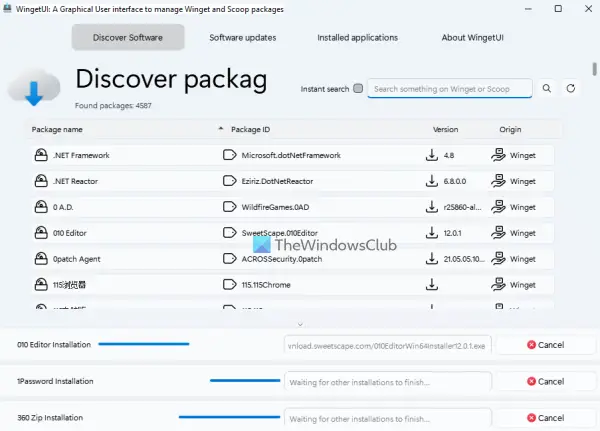
This is the most important section of this tool. Here, you will see the list of all available software packages (like .NET Framework, Notepad++, a word document, file converter, screen capture, and many more) that you can install. For each package, you will see package name, package ID, origin (Winget or Scoop), and version. You can also perform an instant search to find a particular program using the available search box.
When you want to bulk install programs from the available list, right-click on a program, and click on the Install option. The package will be added to the installation list. In the same way, you can add more and more programs to that list. One by one, each package will be downloaded and installed automatically. The installation process would be silent for most of the programs, but you may have to press the Yes button in the UAC prompt if appears for installing a program.
Apart from installing multiple software packages, this section is also helpful to check the description of a program, program homepage, publisher name, author, license, installer type, installer URL, Hash, source, etc., before installing a particular package. This will give you a good idea of whether the program you are going to install is genuine or not.
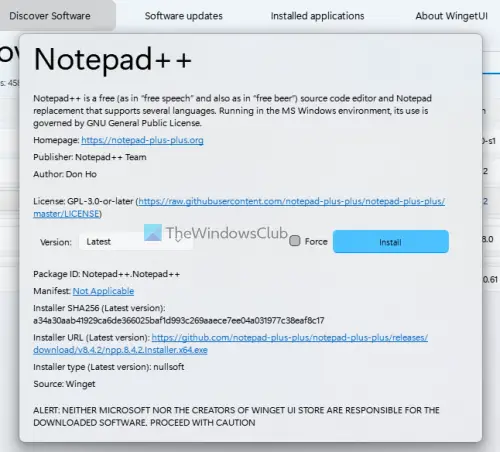
In addition to that, you can also select a particular version for installing a program and also use the Force install option if a program is not able to install for some reason. To access and use all such options, simply double-click on a program. Or else, you can right-click on a program, and use the Show info option. This will open a separate box (like visible in the image above) where you will see all the package information and options.
Software updates
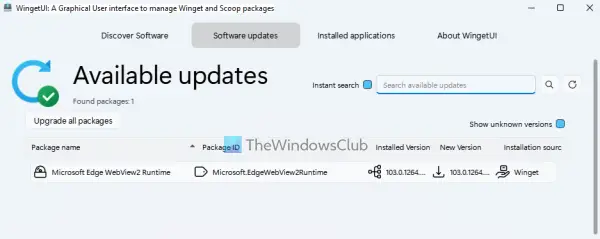
Under this section, you will get the list of all the installed programs that can be updated to the newer version. You can double-click on any program in the list and it will start the update process for that program. The good thing is this section provides an Upgrade all packages button so that you can update all the programs without adding them to the upgrade list one by one.
If you want, you can also right-click on a program, and use the Show info option to get information about that program, select a particular version for the installation, and perform the force installation.
Related: Bulk install Windows apps with Winstall GUI for Windows Package Manager.
Installed applications
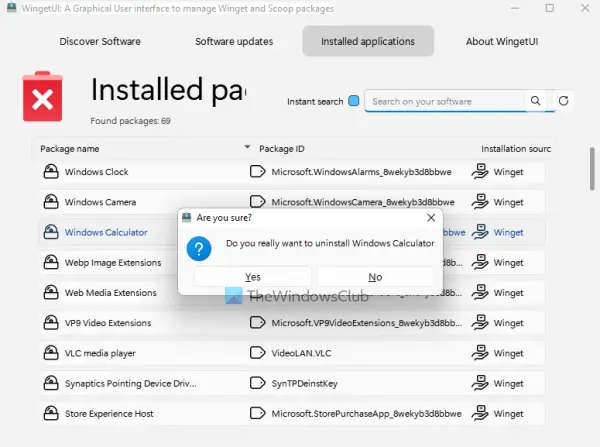
This section is helpful to uninstall pre-installed Microsoft Store apps as well as third-party programs or applications from your Windows 11/10 computer. The total number of installed packages is visible in this section and for each package, you can see the installation source, package ID, and name.
To uninstall a program or app, you can double-click on a package, and then confirm your action by clicking on the Yes button.
Overall, this tool works well, but sometimes it failed to update and install a few programs. If that happens in your case, then you can simply try again and the problem should be solved.
To use this tool, you can get it from github.com. Some antivirus programs may throw false-positive warnings about this tool but the tool is safe.
How do you upgrade all packages in winget?
You can easily upgrade or update all installed programs at once using Winget on a Windows 11/10 computer. All it requires is an elevated Command Prompt window or PowerShell window and a simple command. After that, the outdated programs are updated silently and automatically to their newer or latest versions. The command is:
winget upgrade -all
If the above command doesn’t work to upgrade programs silently, then use this command:
winget upgrade -all -silent
Can winget update Windows?
No, you cannot update Windows using winget. But you can use this powerful tool to:
- Install or uninstall OneDrive
- Update or upgrade multiple programs at once
- Export or import installed software list
- Remove installed software and Microsoft Store apps
- Download Microsoft Store apps, and more.
Hope this is helpful.
Read next: Winget not recognized in Windows 11.